
Meet the Nigerian priest who conquered TikTok from a Scottish village
A Pillar interview
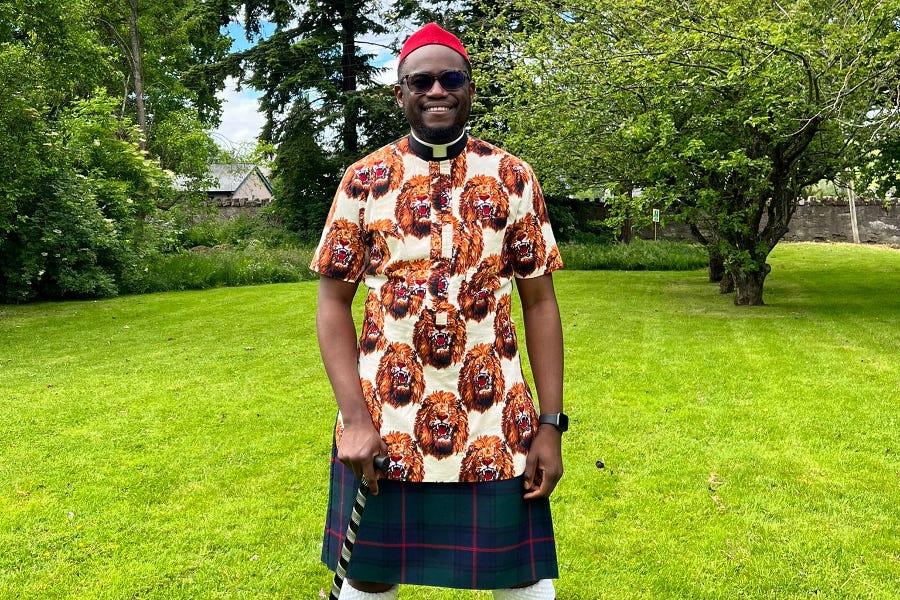
Beauly is a village in the Scottish Highlands whose attractions include a castle, a ruined priory, and a team with a cup-winning pedigree in the sport of shinty.
The settlement, home to around 1,400 people, also contains an impressive 19th-century red sandstone church built with funds provided by a local aristocrat. The Catholic parish often hosts another local attraction with a growing worldwide following: its 36-year-old assistant priest.
Fr. James Anyaegbu’s brief autobiography on the website of St. Mary’s Beauly hints at the reason for his rising fame. “I love music, watching football and basketball, TikTok, and making others happy,” he writes.
In February, the Scottish Catholic magazine featured Fr. Anyaegbu on its cover with the headline: “Is this the most influential priest in Scotland?” The priest was shown standing in a picturesque street with a clerical collar visible over a shirt covered with lion heads, wearing dark glasses and a red hat, and holding a black-and-white striped cane.
The accompanying article described the priest’s unlikely journey from Nigeria to the Scottish countryside, where he has established himself as a leading TikTok evangelizer.
Anyaegbu is one of a growing number of Nigerian priests in ministry in Western Europe and North America, navigating unique cultural challenges in missionary priestly ministry.
The Pillar spoke with the priest on Wednesday, the day after he arrived in Philadelphia, at the start of a journey around the U.S. He shook off his jetlag to discuss his priestly vocation, TikTok mastery, and ever-expanding online ministry.
 Tiktok failed to load.
Tiktok failed to load.Enable 3rd party cookies or use another browser
This interview has been edited for length and clarity.
Where were you born?
I was born in Onitsha in Anambra State, southeast Nigeria. It was a very lively environment. I had a great childhood experience. Also, I must say that it was a very religious environment.
I started talking about my desire to be a priest from the age of six, after I had seen priests celebrating Masses on the altar. I saw the way they carried themselves. My mum and dad took me to church almost every morning for Masses. So I started nurturing the desire to be like these people that I usually see on the altar and to celebrate the Mass.
My parents didn’t buy into it at the time because they wanted me to be a medical doctor, lawyer, or engineer - something like that. My dad and my mom, they’re very religious people. But they felt they needed me to be a professional in some field. So when I made my desire known to them, it was a bit of a shocker.
Were you their first son?
No, surprisingly, I was the last. We used to be three brothers, but one died in 2015, and three sisters. I was the overall youngest.
You were accepted to be a priest in a different diocese from the one in which you grew up.
Yes, the Diocese of Aba in Abia State. I missed the opportunity of taking the entrance examination to the minor seminary within my state. They had already finished, so I had no opportunity of going in there. I had passed all other entrance examinations to the state schools, but that was my desire. My mom’s sister, my aunt, who is a nun, knowing my desire, decided to help introduce me to the Aba diocese.
And it was from that moment that my parents asked me the one important question: “Is this truly who you want to be?” And I said: “Yes.”
So they both had their meeting - you know, mother and father meeting - and then they sat me down, looked me in the eyes, and asked me that question. And once I answered it, and without mincing words, both of them from that moment gave me their full support, 100%.
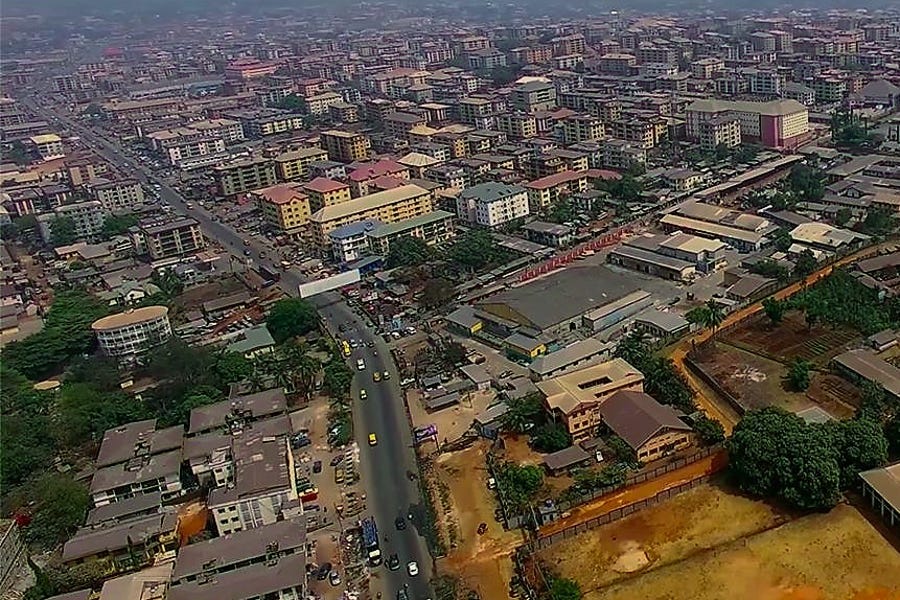
And you were a teen at the time?
I was just 11 - junior seminary.
How old were you when you were ordained?
Twenty-seven. In Nigeria, the formation is six years of minor seminary, which is secondary school. Then one year of formation in between - they call it propaedeutic seminary - that prepares you and introduces you into the major seminary, where you study philosophy and theology. I studied philosophy for four years and theology for another four years.
I was ordained on July 6 [2013] in Onitsha, but for Aba. It was a day I’d always looked forward to. And on that day, I felt different. I felt something had changed in me. I felt this is that road I wish to take. I felt so happy about it. It was a nervous experience at the same time, as I felt nervous going on that road. But without a doubt, I was so happy within me.
You had two years of ministry in Abia, then you moved to Scotland. What a transition. How did that come about?
While I was doing my first year in Nigeria, I went on a holiday to the UK. I went to Coventry, London, and came to Scotland to visit my cousin. During that visit, we attended a Mass celebrated by the Bishop of Aberdeen, Bishop Hugh [Gilbert]. It was on Palm Sunday. I had a word with him after I enjoyed the Mass. He was a very friendly man, very approachable, and he immediately invited me to come to his house: “Let’s have a chat. Let’s celebrate Mass and have breakfast.”
I didn’t meet up with the Mass because of transportation. But I came just as Mass was ending and then had breakfast. It was to my utmost surprise that a bishop would make breakfast for me. Where I’m coming from, it’s not so. In Nigeria, you have a cook and everything, but here he actually made breakfast and we ate. So after our chat, we became friends and later on, he demanded for me to come over.
I was not coming alone, because we belong to Abia diocese but we also have a community - a society of apostolic life - that we belong to. It’s the Congregation of Christ the Emmanuel. We are called Emmanuelites. With this society of apostolic life, we don’t go as individuals. We go in pairs on mission. So the bishop had to select myself and then my colleague, Fr. Max [Nwosu], so that we complete the quorum.
What did you know about Scotland before you went there?
What everybody also knows: the coldness of Scotland.
I came on holiday that year in April, so it was very cold. If I show you one of the pictures, you see me wearing a female jacket. My cousin didn’t have a male jacket in her home, so I had to take that one.
So that was something I thought deeply about before coming - and also that I’d be going into a new environment where it’s a totally different culture. But what I had always heard from priests who had been from Nigeria was that Scotland is very hospitable and the people are nice. They always give this great review about Scotland and its people. It really helped my decision.
You weren’t being sent to Glasgow or Edinburgh, but to a remote area.
Exactly. The bishop showed me the map. I realized the diocese is big, but less people with huge geographical areas to cover.
Had you lived in a village before?
No, I’m a city person. The idea of a village in Scotland is different to the idea of a village in Nigeria. The idea of a village in Nigeria is a fully undeveloped area or less developed area. Our villages used to not all have tarred roads, but dusty places, a kind of natural environment. Now it’s changed because lots of developments are coming into many villages.
That idea of a village is different from what you experience in Scotland. In Beauly, everything you could find in Aberdeen [a city of around 229,000 people], you could find around Inverness-shire. It’s easier to get to a petrol station, a post office. You have access to everything. Having come to Scotland and stayed now, I understand fully village life and city life in a Scottish setting.
But when we came in in 2015, we had some months of preparation. We stayed with the bishop. We talked about the culture, places. We did our PVG [safeguarding check] and everything. We came in August and by October, we were sent to Beauly.
What were your first experiences like with the people there?
We were received very well by two parishioners named James and John. They took care of us. And then later on some more families made sure we didn’t lack anything. Especially with the weather, people will always say: “Make sure you cover yourself up. Wear your thermals. Always wear your jacket.”
Apart from how people reacted towards us, it wasn’t very easy to adapt, the first time in Beauly, because of the quietness of the area. [Compared to Nigeria,] it wasn’t as noisy and full of people, cars, joyful moments. Here, it’s like you’re on your own. You create your activities. So, it was different.
I took some time to adapt to such a lifestyle.
Did you find yourself asking God why he’d sent you somewhere without many people?
I did not ask that personally. My mind was always made up, like “God, if this is where you want me to go, give me the strength to do whatever you want me to do there.”
Things got even more lonely when the coronavirus pandemic hit and the country went to lockdown in March 2020.
Around October 2019, I started an online YouTube daily meditation, where I talked about the daily sermons. It engaged my evenings a lot because I would post every evening for every day except Sunday. I went on holiday between that December and January 2020, came back, continued, and then this lockdown came in March.
During the lockdown, instead of just doing the daily meditation, we started celebrating Masses online. We celebrated our first Mass on March 25, the feast of the Annunciation.
Did you find lockdown challenging?
It wasn’t challenging to me because I was already having conversations online with my daily meditation. So while people were finding it difficult, I was fully engaged online. My engagement made me not feel somehow the mental impact of the lockdown. I did lots of video editing. It took my whole day, so I didn’t even have lots of time to spare.
 Tiktok failed to load.
Tiktok failed to load.Enable 3rd party cookies or use another browser
When did you first hear about TikTok?
I think it was later, in April 2020. Some of my friends’ children were there, so I downloaded the app to keep an eye on what’s going on, to make sure they were not misbehaving. I started enjoying the app when challenges were being done, families dancing… I saw a whole lot going on.
[At first,] I felt it was not my place to be, because I never saw anything about the priesthood or Catholicism. But I decided to go into it. I started with what I called “Three reasons why…” I did videos on “Three reasons why you should give thanks to God,” “Three reasons why you should forgive,” “Three reasons why you should go to Confession.” Things like that. I did it under one minute because then TikTok had only a minute.
Then, this dance came out, “Jerusalema,” and people loved it. Even before that one, there was a sound that came out. People were dancing to it, so I thought I should use it to do the Sign of the Cross, instead of just dance to it. I did the Sign of the Cross with the dance.
People loved it, though I did receive some backlashes from people: “Father, you shouldn’t be here. This is not a place for a priest.” But the more these backlashes came, I felt this is a place for me, because Jesus was in a place where they told him it was not a place for him, but he made it a place for him - you know, amongst sinners. I said: “That’s where I should be.”
 Tiktok failed to load.
Tiktok failed to load.Enable 3rd party cookies or use another browser
Were your superiors understanding?
I think they accepted it. During the lockdown, I remember posting some of them on YouTube and on Instagram and I got lots of positive feedback from parishioners who saw them. Some said: “Oh, Father, you just made my day.” I felt: “OK, so people are connecting to the messages. Let it continue.” Talking about my superiors, the bishop has not said anything against it.
It’s said that, in the past, some Protestant Christians in Scotland were opposed to dancing.
Yes, I know. The thing is, dancing is part of my culture in Nigeria. We are a dancing society. We love dancing. We love expressing ourselves through dance.
In the West, dancing is often associated with sexuality.
It’s totally different in Nigeria because it’s something everyone does. Not just something everyone does; it’s something everyone wants to do - almost everyone. Sometimes we know different traditions or cultures through the way they dance. For instance, if you come to the Igbo area of Nigeria, you will know this person is from here with the way they dance. Because even in Igboland, we have lots of different traditions.
Do priests dance in Nigeria?
Yes, the priest will dance. But it wasn’t something very popular or common.
So they wouldn’t dance at Mass?
They would do if it calls for it, especially during the Offertory procession and during thanksgiving. But it’s not that common.
Did your way of making TikTok videos change as you got more experienced?
I had to put in more effort - and try to also make sure I didn’t go overboard at the same time. Before I post a TikTok video, I would have to watch it. In fact, I’ll watch it and I will get tired of it before I post it. I’ll make sure everything is according to the mind of the Church and has that spiritual undertone.
Do you follow certain rules?
Not really. I think it’s just a free freestyle thing. It’s just a free thing I do. But to make sure that I am being me, most especially, and, in being me, I am in line with my spiritual being and what the Church is talking about. So it will always be very simple dance steps, nothing complicated.
Do you have any help making the videos?
My colleague, Fr. Max, was very helpful and encouraging.
During the lockdowns, I remember, sometimes after Mass, I’d be like: “OK, let’s do TikTok.” He would hold the camera for me. We would set up the lights and do a repetition of one particular TikTok video. We’d keep doing it and he’d evaluate it. He will help me to make the decision: is this a good one or not? I do the editing. His work is to help me with the camera, help me make judgments.
Do you read people’s comments?
I started reading comments and then I stopped.
Why I stopped was that one negative comment can spoil your day. And then later on, when I became so confident about everything, I read as much as I can. I try to respond also to some of them. But when I don’t have much time, I don’t.
 Tiktok failed to load.
Tiktok failed to load.Enable 3rd party cookies or use another browser
How do you approach negative comments now?
Now I read them with an open mind and knowing that whatever I’m putting out, I have asked myself a thousand questions about it. Whatever comment comes in now, people reply to those comments, no longer me. So if one person puts in a negative comment, three, four, five, six persons are already responding to it. It makes me confident that people now understand what’s going on. They now know me and there are people who are willing to defend everything I put out.
So my work is to make sure that I put up something that will help them to still defend the faith. I wouldn’t take it for granted.
Does anything about TikTok worry you? For example, some people talk about how it’s owned by China and the Chinese government can access your data.
No, it doesn’t trouble me. Still, I feel I need to do a lot to protect my data, because I wouldn’t like somebody to hack my platform and use it for a reason why it’s not made. So that’s where I get worried.
Do people ask for advice about sharing their faith online?
Oh, a lot. Because of that, I founded Faith-Chat Platform. It asks the question “When Christ comes again, will he find any faith on earth?” from the Gospel. Faith-Chat Platform is an apposite response to the crisis of faith that people face today.
How it all started was, I used to raise a topic. I’d say: “Why is Mary called the Mother of God?” And I would send it out to friends and say: “Make a one-minute video answering this question. Send it to me, and I’ll put them all together and post them on YouTube.” I used to do that weekly or monthly as early as 2020.
By September [2020], the name “Faith-Chat Platform” came out. And then by December, we went into Instagram, where we explain the faith using the Bible and the Catechism.
Then people started coming personally to ask questions about their faith and tell me what they are facing: family problems, marital issues, relationship problems, people needing counseling. In fact, this September, I’ll be starting a counseling diploma for two years at the University of Highlands and Islands, to become a professional in helping people. A lot of people are suicidal now. People are facing a lot of relationship issues, mental health problems. Catholicism also - asking lots of questions about Catholicism.
Faith-Chat Platform comes out to answer these questions, to help people, with their material well-being also. Pope Francis has asked us to not just focus on words, but also charity work. We started last year in February and we’ve been to Nigeria, Mozambique, Kenya. People were happy to say: “Father, what do I give you, to appreciate what you’re doing?” And I channeled all those [gifts] into helping people with material problems.
What do you know about your online audience?
We have lots in Ghana, Mozambique, Kenya, Congo, Gambia, and Nigeria of course. Then lots in the United Kingdom and also here in America, as well as Canada, the Philippines, and India.
 Tiktok failed to load.
Tiktok failed to load.Enable 3rd party cookies or use another browser
Do you ever feel overwhelmed?
I’ve always seen it as doing my daily work. By the grace of God, I’ve not allowed it to weigh on me. I have also made sure that it does not interfere with my parish works and the people around me as well. I must say I always pray for grace.
Faith-Chat Platform is growing and we’re writing books to solidify the faith. We’re writing, first, books on the doctrines and Catechism of the Catholic Church and also on children’s Bible stories. The first series, hopefully, will be coming out before December. And then we can take it off from there.
We’re also praying online. We do Catholic novenas and we’ll read the Bible. We talk about the Catechism of the Catholic Church and also modern trends. I invite professionals to talk about different topics. We talked about mental health, self-esteem - things that could make someone ask a question about their faith. So we answer those questions there. We are growing. Faith-Chat Platform is so dear to my heart.






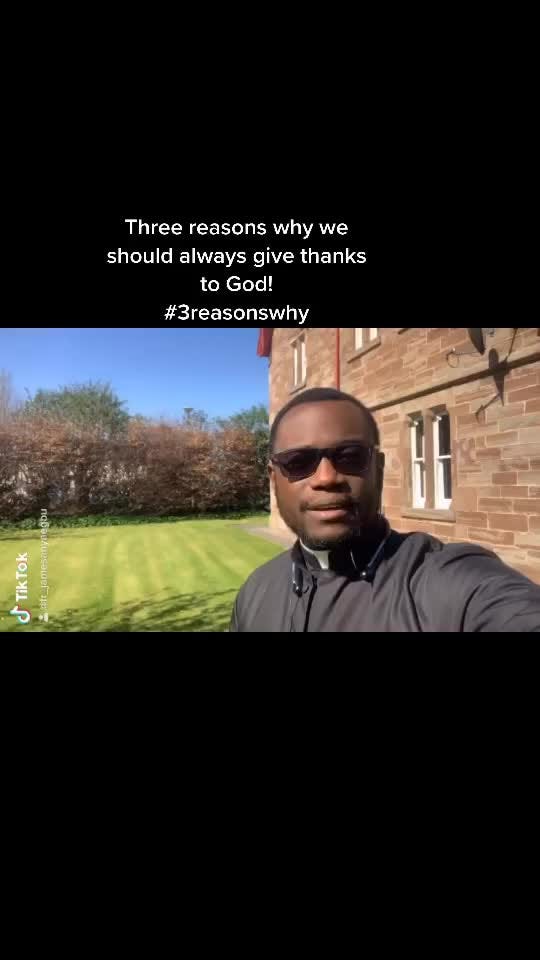
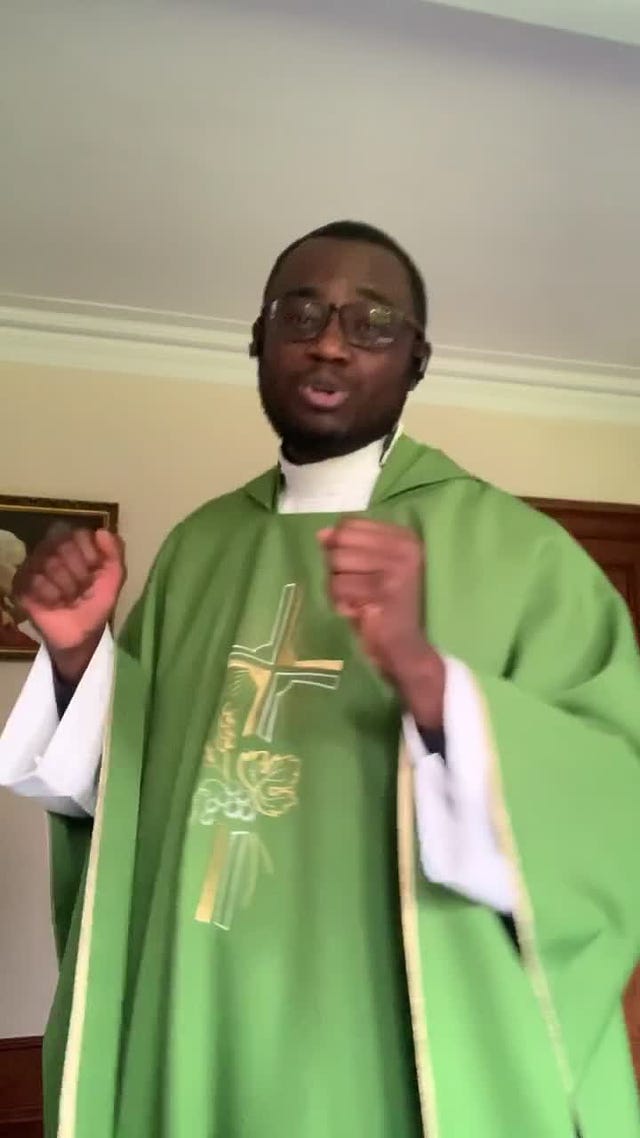

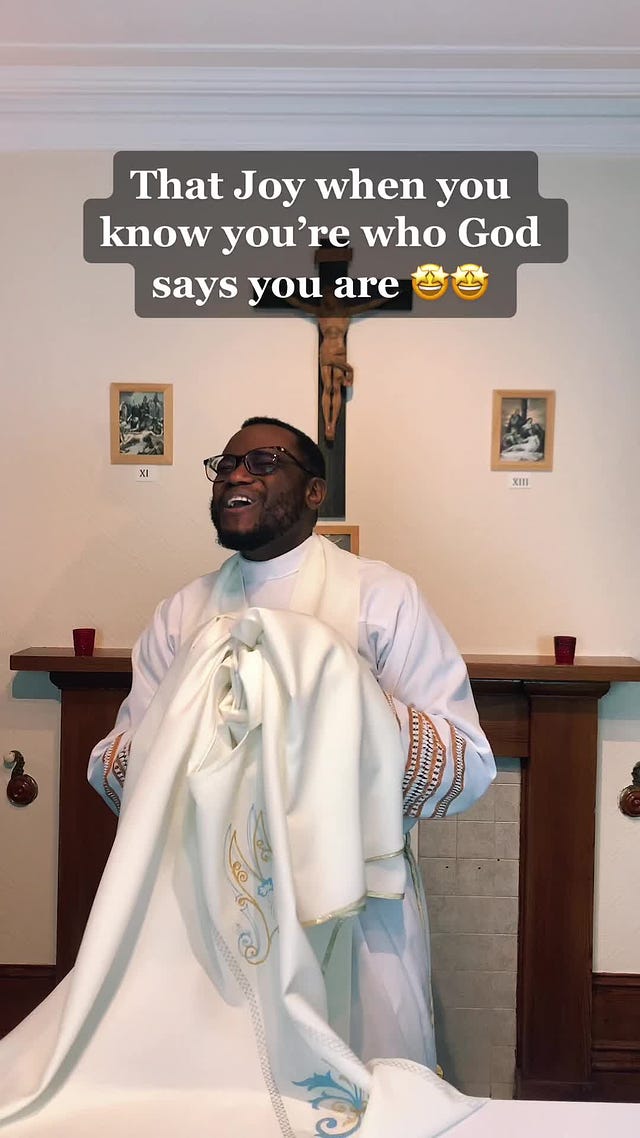
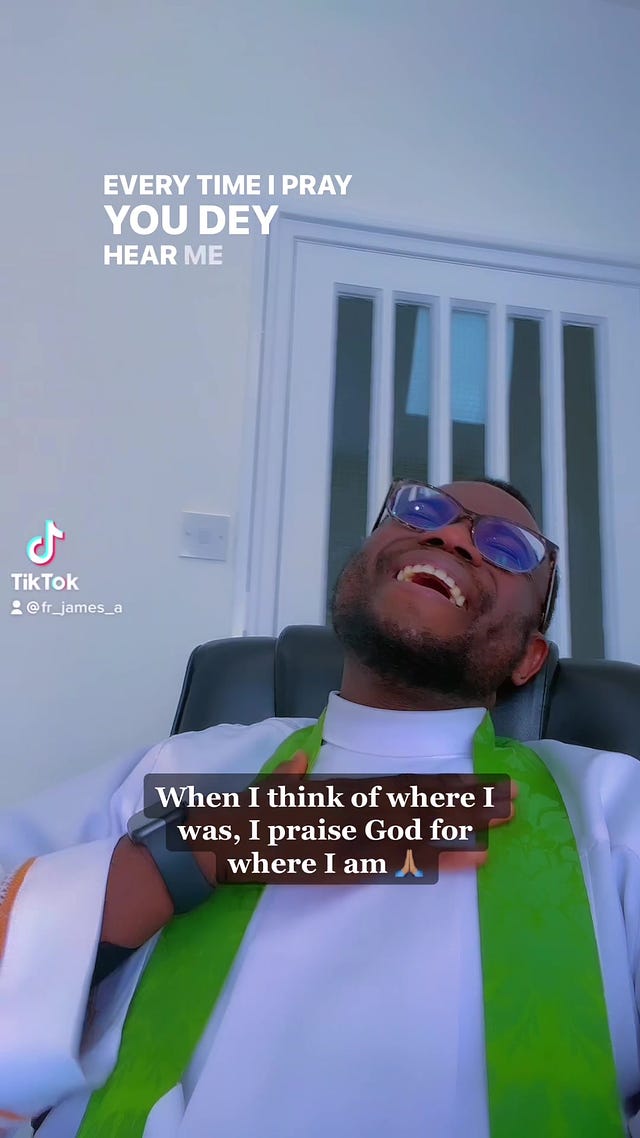








Thank you so much for this piece. We have Nigerian priests at my parish in Los Angeles and they are such a gift.
Thank you for this excellent article on a vibrant, creative, energetic and pastoral priest. I would enthusiastically welcome him to my parish. With that authentic thought and endorsement, I am not totally in favor of having foreign priests as a resource to address our current priest shortage for two reasons:
1) Priests, especially diocesan priests are called from a people for a people. It is not easy for me to accept the why of any priest from a country or culture in which the people are persecuted to death or their worship is constrained or members are abandoning the church in dramatic numbers (i.e. Latin America) to come to a first world country that is not experiencing such. Is there a demand for their charisms here? Of course. I am grateful for their presence. Yet it supports a systemic problem that continues to contribute to an ongoing priest shortage in this country.
2) Recruiting priests from foreign countries is I believe a form of clerical capitalism. A Bishop who is responsible for meeting the sacramental needs of his people takes the easy way out. It is easier to get results by sending vacation directors to Nigeria, Poland, Columbia, Mexico, etc. than to engage all of us here to address this issue. The challenge must be shared by each parish, each parishioner. It is too easy to sit back and say will get someone from somewhere else to come to be our priest, and then have the audacity to complain that we cannot understand the man or criticize him for his slowness to acculturize.
We must continue to pray for vocations, support organizations that actively support homegrown callings (Sierra Club). We can also do things ourselves. After every mass I will seek out the servers who ministered at the Eucharist. I will thank them, young men and women alike. I also will mention to the young men that they looked great up on the altar, simply planting a seed. If I hear of someone who is considering a call to priesthood, I will send them a card of support to continue on their discerning journey. When a seminarian comes to the parish for the summer, I take time to be affirming beyond the casual greeting. Again my actions are meager, perhaps others have more creative ideas to share. I know there was a great push to get Latin American priests to minister to our Spanish Speaking brethren, but I think most priests are now bilingual at least to some degree. Also the Latin church is quickly moving beyond immigration status into a first and second generation presence and acculturation. Are we seeing vocations from this group? Let me conclude as I started. Fr. James is a gift to the people to whom he ministers. Praise and blessings for his presence. Yet I also believe the issue I raised is valid or at least merits further discussion. This is why I love the Pillar - for creative articles such as this and the invitation to comment.
Terrance Glamp